Interrogative - Warren County Schools
advertisement
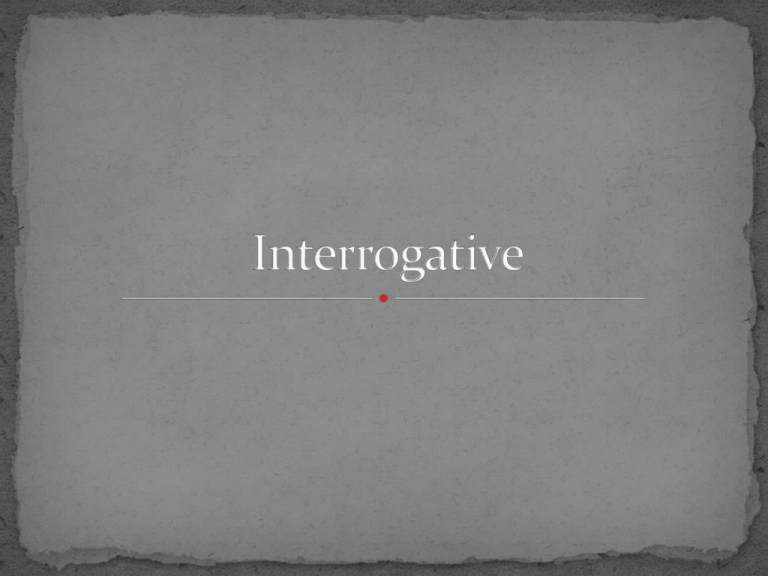
The interrogative structure indicates that the speaker is searching for information In other words, we use the interrogative to ask questions English uses helping verbs and participles to make the interrogative sentence The helping verb is inverted, or switched with the subject. She is going to the supermarket. Is she going to the supermarket? In the emphatic (DO) form, we invert “do” and the subject. They do sing at church. Do they sing at church? When there is no helping verb in the declarative (statement) form, we must decide whether to use the “be” verb with the present participle (-ING), the “do” verb, or nothing at all. You walk to school. Are you walking to school? Do you walk to school? You walk to school? Convert these sentences from declarative to interrogative using BE as a helping verb 1. I am seeing the light. 2. They were shopping for a car. 3. The chef cooks chicken. 4. You go. 5. You are good (you must use BE as a helping verb) Convert these sentences from declarative to interrogative using DO as a helping verb 1. I walk every morning. 2. We do study French. 3. Mr. Spinks went to the band contest. 4. You remember me. 5. She had a great time. There are THREE ways to ask a question in French Do nothing/Change pitch of voice/Add question mark 2. Est-ce que and its variants 3. Inversion of verb and subject 1. You can add a question mark to a sentence to make it a simple yes/no question Tu es de France. Tu es de France? When speaking, you need to raise the pitch of your voice at the end of the sentence. This indicates that you are asking a question. Used frequently in asking yes/no questions. Est-ce que is a fixed expression. THERE IS NO DIRECT TRANSLATION TO ENGLISH. Est-ce que + subject + verb + ? Vous allez au magasin. Est-ce que vous allez au magasin? Il pleut aujourd’hui. Est-ce qu’il pleut aujourd’hui ? Put the sentences in interrogative form using “Est-ce que” 1. Tu marches vers la porte 2. Elles vont aller à Londres 3. Nous sommes près du stade 4. Tu t’appelles Nicole. 5. Il obéit la loi. Combien de – How many?/How much? 1. Combien de livres est-ce que tu lis? Comment– How? 2. Comment est-ce qu’il lave la voiture? D’où – From where? 3. D’où est-ce que nous allons débarquer? Où – Where? 4. Où est-ce que tu habites? Pourquoi? – Why? 5. Pourquoi est-ce qu’ils rougissent? Quand? – When? 6. Quand est-ce que vous mangez le biscuit? 1. 2. 3. 4. 5. 6. When do you work? (tu) How many hours are we walking? How do they dance? From where are you coming (vous venez)? Where is she going? Why are you calling me (téléphoner à)? (vous) When the subject is a person, use Qui est-ce qui? “qui” replaces the subject (je, elles, Marc, for example) Qui est-ce qui entre dans la classe? Marie entre dans la class When the subject is a thing, use Qu’est-ce qui? “qui” still replaces the subject Qu’est-ce qui passe à la télévision ce soir? The Big Bang Theory When the object is a person, use Qui est-ce que? “que” does NOT replace the subject Qui est-ce que nous aimons? Nous aimons le prof d’histoire. When the object is a thing, use Qu’est-ce que? “que” does NOT replace the subject Qu’est-ce que vous préparez? Je prépare le dîner. Insert the appropriate interrogative words 1. 2. 3. 4. 5. ____________ tu joues au tennis? – En été ____________ les lions habitent? –Ils habitent en Afrique. ____________ joue dans Twilight? Kristen Stewart ____________ on mange en été? –Des tomates! ____________ sanwiches ____________ tu manges? –Trois! Insert the appropriate interrogative words 1. 2. 3. 4. 5. Quand est-ce que tu joues au tennis? – En été Où est-ce que les lions habitent? –Ils habitent en Afrique. Qui est-ce qui joue dans Twilight? Kristen Stewart Qu’est-ce qu’on mange en été? –Des tomates! Combien de sandwiches est-ce que tu manges? –Trois!
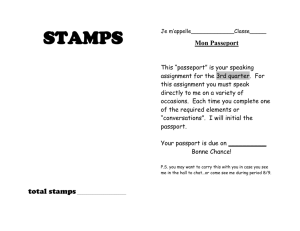
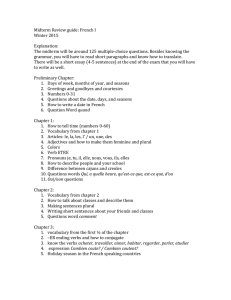
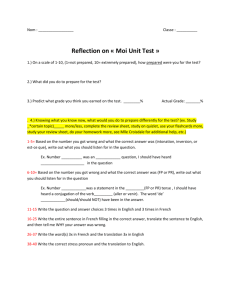
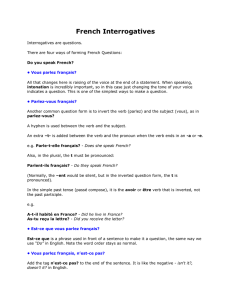
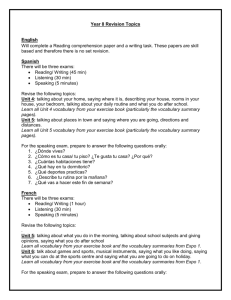
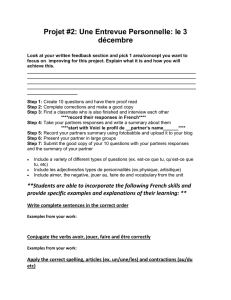
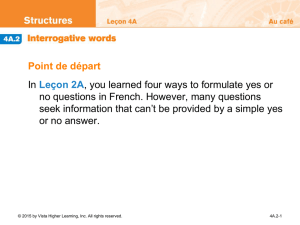
![Download[MS WORD] - OLA Girls' College](http://s3.studylib.net/store/data/009573871_1-d6c40cf083553b1020f3f3c101144d7f-300x300.png)